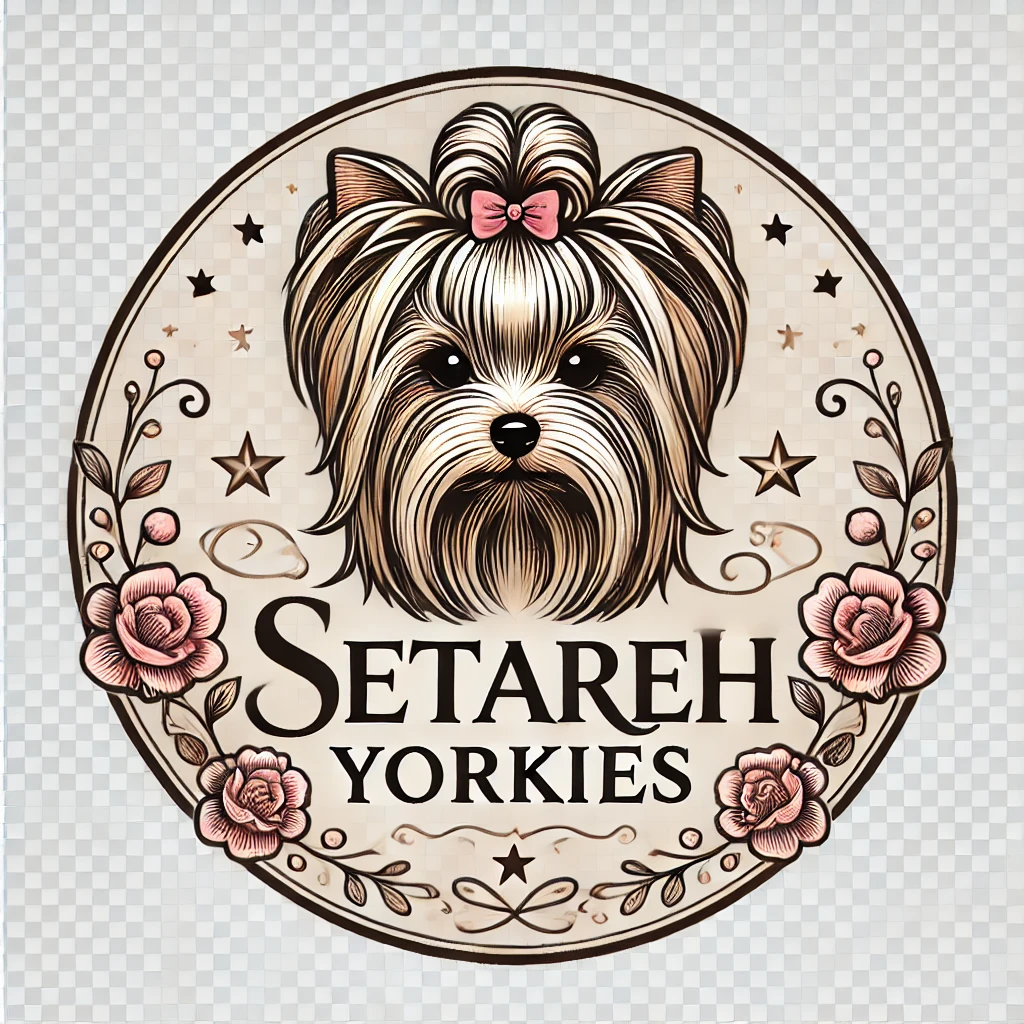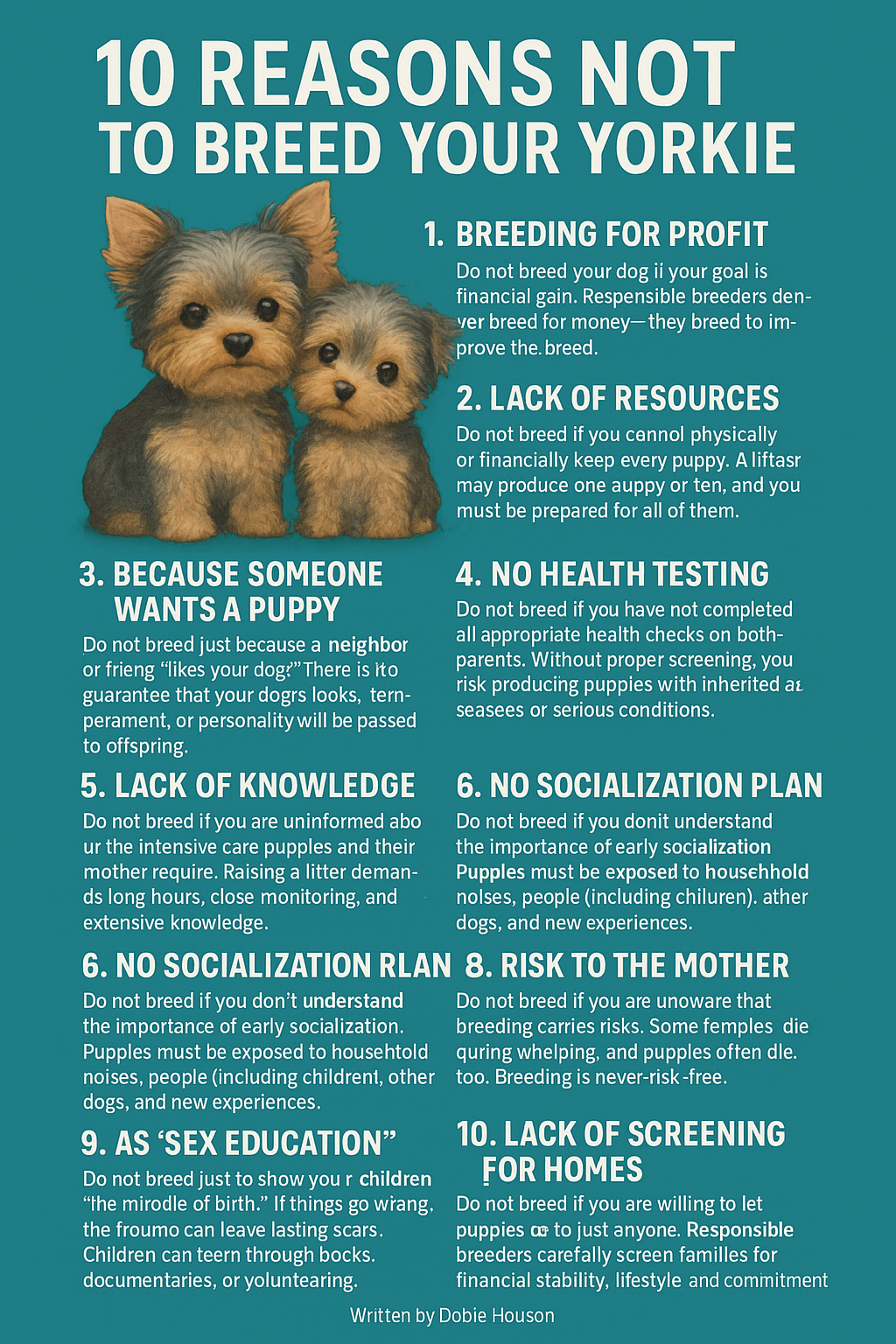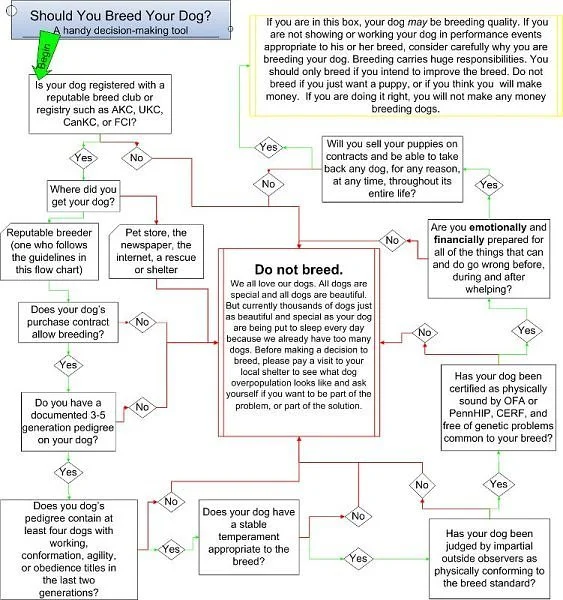
Breeding Your Yorkie
10 Reasons
NOT
to Breed Your Yorkie
Breeding dogs is not a casual decision — it’s a serious responsibility that should only be undertaken by those committed to advancing the breed in health, structure, and temperament. If your reasons fall into any of the categories below, breeding is not the right choice.
1. Breeding for Profit
Do not breed your dog if your goal is financial gain. Responsible breeders never breed for money — they breed to improve the breed. They also stand behind every puppy they produce, ensuring that each has a forever home, with the breeder always willing to take a dog back if needed.
2. Lack of Resources
Do not breed if you cannot physically or financially keep every puppy. A litter may produce one puppy or ten, and you must be prepared to house, feed, vet, and care for all of them if suitable homes are not found.
3. Because Someone Wants a Puppy
Do not breed just because a neighbor or friend “likes your dog.” There is no guarantee that your dog’s looks, temperament, or personality will be passed to offspring.
4. No Health Testing
Do not breed if you have not completed all appropriate health checks on both parents. Without genetic and structural health screening, you risk producing puppies with inherited diseases or serious conditions that could have been prevented.
5. Lack of Knowledge
Do not breed if you are uninformed about the intensive care puppies and their mother require. Raising a litter demands long hours, close monitoring, and extensive knowledge.
6. No Socialization Plan
Do not breed if you don’t understand the importance of early socialization. Puppies must be exposed to household noises, people (including children), other dogs, and new experiences to grow into confident, well-adjusted companions.
7. Poor Temperament or Structure
Do not breed dogs with poor temperament, even if they are structurally correct. Likewise, do not breed structurally unsound dogs, even if their personality is lovely. Both flaws will be passed on to offspring.
8. Risk to the Mother
Do not breed if you are unaware that breeding carries risks. Some females die during whelping, and puppies often die, too. Breeding is never risk-free.
9. As “Sex Education”
Do not breed just to show your children “the miracle of birth.” If things go wrong, the trauma can leave lasting scars. Children can learn through books, documentaries, or volunteering — not at the expense of their pet’s health.
10. Lack of Screening for Homes
Do not breed if you are willing to let puppies go to just anyone. Responsible breeders carefully screen families for financial stability, lifestyle, and commitment before placing a puppy. If a home isn’t right, a good breeder says “no.”
✍️ Written by Dobie Houson
Reasons You Shouldn’t Breed Your Yorkie
Breeding isn’t a bucket-list experience or a way to make extra cash. It’s a serious, lifelong responsibility to the puppies you produce and to the breed. If any point below resonates, breeding isn’t the right choice.
1) “Breeding will make money.”
Responsible breeders rarely profit; most break even or end up in the red. Expenses include:
Breeding-quality female (and often co-ownership/mentor fees)
OFA/Embark/genetic + orthopedic/eye/heart testing
Progesterone timing, stud fee, shipping/AI, vet pre-breeding exams
Premium food, supplements, whelping supplies, neonatal care
Missed work around heat, breedings, whelping, and the first weeks
Emergencies (C-section, fading puppy support, ICU)
Vaccines, microchips, deworming, vet checks, registration, insurance
Time for screening homes and lifetime support/returns
Cost breakdown resources:
O’Mal Malamutes – Cost of Raising a Litter • Leema Kennel – “I Haven’t Raised Any Money” • Cryslen Kennels – Cost of a Responsibly Bred Litter • Good Dog – What Goes Into Puppy Cost • Powder Mals – Cost of a Well-Bred Puppy
2) “I want my kids to see the miracle of birth.”
Whelping is messy and risky: placentas, fluids, stillborns, reviving neonates—and sometimes emergency C-sections. In worst cases, families lose the dam or pups. For learning, choose documentaries, breeder-vetted videos, or volunteering—not your own pet’s life.
3) “I want another dog just like mine.”
Genetics don’t copy/paste. Even littermates can be polar opposites in temperament and drive. If you want “another just like her,” start with the same breeder/lines and a careful placement—not a one-off breeding.
4) “My friend wants a puppy!”
By the time pups arrive, that “sure thing” often disappears. Breeding to fill casual requests creates supply without responsibility. Refer friends to reputable breeders instead.
5) “Every female should have one litter.”
False. Pregnancy/whelping carry real risks (e.g., pyometra, eclampsia, dystocia). Each heat can raise the risk of mammary tumors compared with early spay—discuss timing with your vet. A litter doesn’t “improve” a dog’s temperament and can temporarily change behavior during rearing.
6) No full health testing = don’t breed.
Skipping genetic/structural screening increases the chance of producing pups with inheritable disease. Testing both parents is non-negotiable.
7) Not prepared for 24/7 neonatal care.
Newborns may need round-the-clock weighing, tube/syringe feeding, temperature/hydration management, and fast decisions. If you’re not trained or available, don’t breed.
8) No socialization plan.
Puppies need structured, age-appropriate exposure (surfaces, sounds, handling, grooming, kids, dogs) and early conditioning (nail care, crate, car rides). Without it, you risk behavior problems later.
9) Breeding poor structure or poor temperament.
Don’t breed a lovely temperament with poor structure—or great structure with a sketchy temperament. Both are heritable and matter.
10) Willing to sell to “whoever shows up.”
Ethical breeders screen homes, match carefully, and always take dogs back—for life. If you won’t do that, don’t produce puppies.
Final Thoughts (from Setareh Yorkies)
Yorkies should only be bred to advance the breed—health, temperament, and adherence to the AKC standard. Be prepared to:
Take back any puppy at any time
Provide lifetime support to every family
Have an emergency fund (an after-hours C-section can easily exceed $3,200+)
Miss sleep, miss work, and still show up for the dam and litter
We’ve bred dogs for 20+ years. We’ve seen the good, the bad, and the heartbreaking. Breeding is not for the faint of heart—please think it through.











